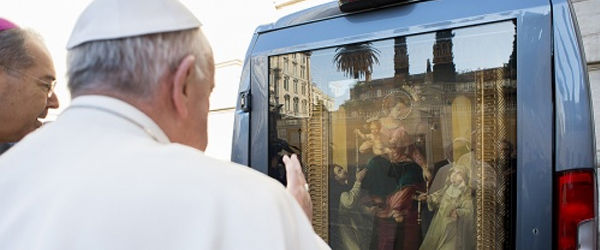No community should botch its deaths! Those are the words of the famed anthropologist, Mircea Eliade, and I use them here to introduce a tribute to Otto Herschan, a long-time Catholic publisher, who died on July 12 at the age of 84.
For many years he was the publisher and Managing Director of a number of national Catholic weekly newspapers, including the Catholic Herald in England, the Scottish Catholic Observer in Scotland, and the Irish Catholic in Ireland. He brought an interesting background to Catholic journalism.
He was born in Austria and, at age 10, came to England as refugee with his mother just before World War II. His father, who put his wife and Otto on the Orient Express bound for London just before he died, had been an Austrian army officer and in the first chapters of Otto's autobiography, Holy Smoke, he describes the trials of Catholicism in Austria as it was passing into Nazi control.
Upon arriving in England, Otto was educated by the Benedictines at their school in Herefordshire, Belmont Abbey. After graduating, he worked briefly in accountancy and advertising, before enrolling for a college degree, but lack of funds obliged him to leave after a year. Otto then turned his energy to the theater, joining the Boltons Theatre, the best known of London's theatrical clubs in the 1940s. He worked there in a number of capacities: scene painter, actor of small parts, and eventually as theater manager, becoming at the tender age of 21 the youngest theater manager in London. But financial troubles forced the Boltons Theatre to close in 1950. He then worked for a time in television, helping found the first commercial TV station in England.
This led him back to the theater where, in 1954 at a fundraising event, he met the chairman for the Catholic Herald who invited him to take over the management of the paper. He protested, saying that he knew nothing about running a newspaper and was told in reply: "That may be a very good start!" He then served as Managing Director of the Catholic Herald for nearly 50 years.
As publisher of a number of Catholic newspapers both during and after Vatican II, he was always able to have his newspapers walk that fine tightrope between liberal and conservative ideologies.
Under his vision and guidance, the Catholic Herald evolved from serving a small, closed constituency within which the purchase of a copy was regarded as an act of piety to become a national and international Catholic weekly that appears on newsstands through the English-speaking world. He recruited talented journalists from the secular press and the Catholic Herald became a feisty and highly sought-after newspaper. As publisher of a number of Catholic newspapers both during and after Vatican II, he was always able to have his newspapers walk that fine tightrope between liberal and conservative ideologies. Invariably his newspapers were considered too liberal for the conservatives and too conservative for the liberals. Not a bad critique.
As a publisher with a very limited budget, Otto was good at spotting talented young journalists, hiring them to edit his newspapers, and then after a few years giving them his fullest blessing as they moved on to more profitable jobs within the secular press. In this way, he helped launch the career of a number of very good young journalists; but it was a win-win situation for both, the aspiring young editors looking to make a start and for the Catholic press who benefited from their talent. During his years in publishing he also developed life-long friendships with leading church people everywhere, including Archbishop Denis Hurley of South Africa and Cardinal Franz Konig of Vienna.
I first met Otto in 1990, when he recruited me to write a column for his newspapers and, in the twenty years since, I have enjoyed a wonderful friendship with him and his wife, Marie. Despite being humble and approachable, he was always a little larger than life. He brought color into a room. He loved life, loved work, deeply loved his wife, and especially loved long, late-night dinners, stoked by good wine, ecclesial talk, banter, humor, and friendship, capped-off with good cigars.
Time stopped during these dinners, a glance at your wristwatch was forbidden, and even though you paid a price for it in tiredness the next day, you knew that, during those hours at table together, you were doing what you are supposed to be doing your whole life, just enjoying friendship, love, food, banter, and holy talk together. I will always treasure memories of those dinners in Otto's various clubs, as well as of a couple of all-day drives through the English countryside in mid-summer, car windows wide-open, pipe and cigar smoke wafting about, and Otto's eyes surveying the landscape, checking it out for its beauty and for the possibility of it containing a pub.
No community should botch its deaths! And so it's important to highlight that in Otto Herschan's passing the church and the world lost a true gentleman, a good friend, a man of wit, and man who, like Jesus, tried to draw people of every persuasion together around a common table of friendship and faith.
Oblate of Mary Immaculate Father Ronald Rolheiser is a specialist in the field of spirituality and systematic theology. His website is www.ronrolheiser.com.

